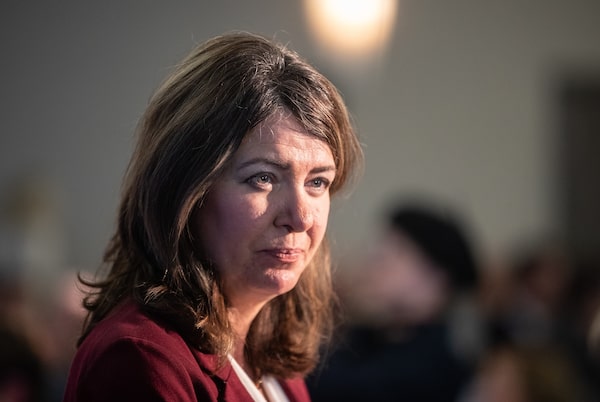
Alberta Premier Danielle Smith speaks at a luncheon hosted by the Edmonton Chamber of Commerce in Edmonton on July 20.JASON FRANSON/The Canadian Press
Professor Jared Wesley is a professor of political science at the University of Alberta and lead of the Common Ground initiative.
The Alberta government has made a sport of fighting federal climate policy, claiming it infringes on the rights of Albertans. Under former premier Jason Kenney, Alberta fought the national carbon tax. More recently, Premier Danielle Smith threatened to use the Sovereignty Act if the federal government doesn’t stay out of Alberta’s energy business. A few weeks ago, Ms. Smith accused the federal Environment Minister of displaying “utter contempt” for Alberta through its plans to cap oil and gas emissions, and warned the federal government to “refrain from testing our government’s or Albertans’ resolve in this regard.”
Whose resolve is she referring to?
Ms. Smith, like others before her, is invoking a narrow stereotype of the average Albertan to project the popular will. In reality, most Albertans are supportive of working with the rest of the country on issues like climate change.
Polls from Leger and Research Co. released this week show a majority of Albertans (around 60 per cent) want a national cap on oil and gas emissions. Support is especially strong among younger Albertans, with 76 per cent wanting a national cap, or the oil industry regulated at the federal level.
After a frightening summer of wildfires that displaced thousands of Albertans from their homes, Albertans are making the link and growing personally concerned about climate change. According to the two polls, around 7 in 10 Albertans say they are personally concerned about climate change.
Our Viewpoint Alberta survey from August, 2023, shows similar results. More than three-quarters of Albertans indicated they are concerned about climate change with nearly half attributing the severity of this summer’s wildfires to global warming. These opinions span the political spectrum, and while they are less prominent in rural than urban areas, demonstrate widespread worry about our environmental and economic future.
In earlier Common Ground research at the University of Alberta, we’ve learned that Albertans are not enraged with the federal government, as the Premier’s talking points suggest. While most feel that their province is misunderstood and sometimes taken for granted in Confederation, the vast majority of Albertans want to build stronger relationships with the rest of Canada. They want to see their governments work together to solve problems (not fight), they want more input into national decision making (not less) and they want to strengthen national institutions (not withdraw from them).
These sentiments are not reflected in the government’s messaging, however. Instead, we see a distortion of the public will with political narratives that speak to a small base of supporters.
Ms. Smith is not speaking on behalf of a majority of Albertans when she turns her back on wind and solar, or when she maligns the federal government as a threat to the province’s interests. She is not advocating on behalf of many in Alberta’s business community, and definitely not the desires of our youth.
Our Common Ground team has spent four years studying the gap between who Albertans actually are as individuals and how they see themselves as a community. Our surveys show the average Albertan is moderate and in many ways progressive when it comes to social and environmental policy. Yet, when asked to describe the attitudes of the “typical” Albertan, our participants peg their political culture as far more conservative.
In our January, 2023, survey, nearly half of all respondents (46 per cent) backed plans to “transition Alberta’s economy away from oil and gas,” with only one in four (23 per cent) opposing the move. In a follow up question, we asked people what proportion of Albertans they thought would back such a transition. The average response was 29 percent, indicating a 17 point gap between actual and perceived support. In other words, Albertans are more supportive of environmental measures than they see themselves to be.
This false sense of social reality stands in the way of reform. If Albertans don’t think their views are mainstream, they’re less likely to advocate for them and more likely to consider environmentalists as “extreme.” And if residents believe the typical Albertan is unlikely to support collective action, they’re less likely to push for it themselves regardless of their own, personal views.
The Smith government’s rhetoric flies in the face of public opinion, typecasting Albertans as shills for the oil and gas industry and enraged at the idea of federal climate regulation. If enough residents realize their own views are in the mainstream, they can begin to throw off these stereotypes and demand more than bluster and foot-dragging from their provincial government. And, more than a distortion of who they really are.